
views
Creating a Positive Mindset

Keep life in perspective. You might feel ashamed or guilty about letting your life get out of hand or for the actions you've taken to get you to this point. Maybe you've messed up the last few months or have gone down a bad road. This doesn't mean that you've ruined your whole life. You've made good decisions in the past and you'll make more good decisions in the future. It's possible to move forward despite your setbacks.

Believe in your ability to self-correct. Believe that you can adjust your negative or addiction-related thoughts. Act as if addiction is not a problem or as though you can approach situations as others do. Believe that you can handle stressors that you've not handled well in the past and this will help you actually achieve it. One way to build your belief is by using coping strategies to deal with stress. If stress used to lead you to destructive behaviors, replace them with more positive behaviors such as journaling, listening to music, writing, or going on a walk.

Practice self-compassion. Instead of beating yourself up or blaming yourself for all the harm you've caused, practice being gentle with yourself. When you notice yourself being harsh or self-critical, use a more positive inner dialog instead. For example, if you notice that you're getting down on yourself, say, “I have made mistakes, as all humans do. I can still love and accept myself despite the mistakes I've made.”

Use positive emotions. After setbacks, do you tend to stay negative or in a rut for some time afterward? Practice responding to negative emotions with more positive emotions. For example, if you feel down or depressed, think of something that makes you feel happy or grateful. Ask yourself, “What positive meaning can I take from this? How has this positively affected my life?” Using positive emotions can help you build resilience, which is a key element to bouncing back. Building a sense of meaning from a situation can help you approach it more positively. For example, you may recognize the preciousness of life when you have a near-death encounter or receive a medical diagnosis.
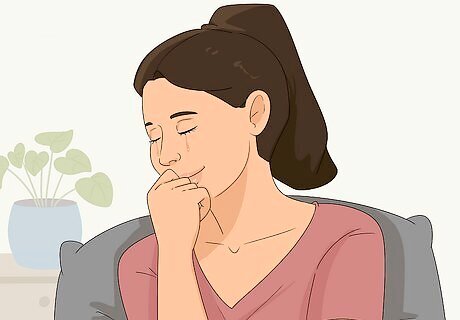
Improve your ability to regulate your emotions. Being able to regulate your emotions is a crucial skill for bouncing back from a difficult situation. If you have good emotional regulation skills, then you can calm yourself when you are feeling angry, cheer yourself up when you are feeling sad, and deal with your other emotions in healthy, productive ways. Keep in mind that sometimes you may need to allow yourself to sit with your emotions and just feel them. This can be uncomfortable, but remember that these feelings will pass. Try telling yourself something like, “I feel hurt and sad right now, and that is okay.”

Work on your conflict resolution skills. Conflict resolution skills can improve your ability to handle problems that may come up in your relationships with friends, family, and coworkers, which may come along with hitting rock bottom. Some things that you can do to improve your conflict resolution skills include: Learn how to relieve stress when it a conflict arises. This can be as simple as taking a few deep breaths. Identify what you are feeling. When you are dealing with a conflict, take a moment to notice your feelings and identify them. Communicate effectively. Improving your communication skills, such as by using “I” statements and becoming a better listener, can also help when you are dealing with a conflict. Use humor to lighten the situation, if appropriate. In some cases, making a joke aimed at yourself or at the situation can help. Just avoid making jokes at the other person's expense.

Develop your problem solving skills. Having good problem solving skills can also help you to bounce back after hitting rock bottom. By developing your problem solving skills and using a problem solving strategy, solving problems may even be less stressful for you. Some things you can do to make solving problems easier include: Writing out your problem in detail. Making a list of all solutions available to you. Analyzing your options to choose the best one. Moving ahead with the solution you have chosen. Reflecting on the outcome and seeing what you can learn from the experience.
Beginning Healthy Habits
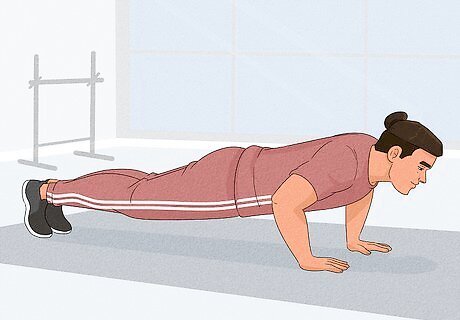
Get moving. Exercise and physical activity are some of the best ways to get back on track. If you're feeling stuck or low, exercise helps to release endorphins, those 'feel-good' hormones. Exercise can help to improve physical health as well as mental health. If you're looking to improve your moods, help you to relax, and to improve your sleep, getting active can help. Exercise can also help treat symptoms of depression, anxiety, trauma, and ADHD. If going to the gym isn't your thing, take a yoga class or try ice skating, rollerblading, or a dance class.
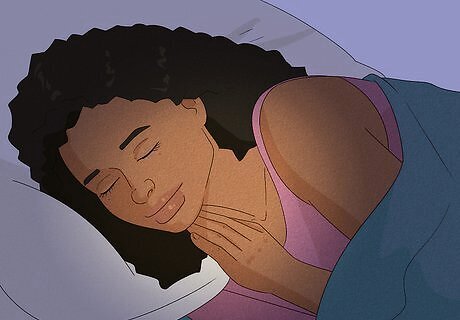
Sleep soundly. Sleep is an important aspect of feeling good and functioning well daily. If your sleep is inconsistent, erratic, or of poor quality, it may hinder you from making the changes you want. Aim to go to bed and wake up at the same each day, even on the weekends. Control your light exposure near bedtime. Avoid watching television, reading e-books or looking at your phone screen right before sleeping.
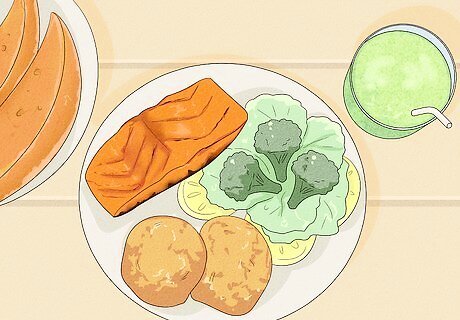
Eat healthy foods. The foods you eat can affect the way you feel. If you're trying to be on the up and up, fuel your body in ways that support it. Eat plenty of fruits and vegetables, cook at home, and reduce your sugar intake. Moderating the foods you eat can help you manage certain mental health problems and regulate your moods. While you don't have to completely eliminate certain foods, moderate what you eat and how frequently you eat the 'unhealthy' foods. If you want to learn more about making good food choices, check out How to Eat Healthy.

Engage with friends. Start spending time with those you care about. If you've been distant from people or isolated, make an effort to reach out. Perhaps you feel alone and are intimidated in making new friends. Friendships can support you during positive moments and hard times and help you to feel connected. Even if you're shy you can meet people and build friendships in your community. Try volunteering at an animal shelter, food bank, or after-school program.
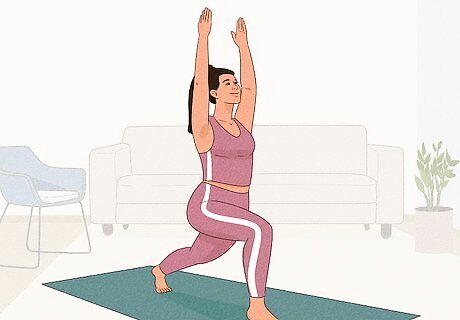
Practice relaxation. If you tend to handle stress destructively, find some healthy outlets for stress, such as relaxation. Using daily relaxation can help you cope with stress as it arises instead of letting it pile up over time. Practicing relaxation for 30 minutes each day can help stabilize your moods and cope with stress. Find relaxation methods that feel good and that you enjoy. Try yoga, qi gong, tai chi, and meditation. Find one you like and stick with it.
Seeking Outside Help

Talk to a good friend. It can be helpful to let a good friend or family member know what you're going through and ask for support. If you've stayed silent through your struggles, now is the time to open up. Talking to someone can give you a sense of relief and help you relieve stress. Find someone who's a good listener and let them know what's happening in your life. It's up to you what you want to say. If you need to let it all out, do so. If there are things you are not ready to talk about, that's okay, too.

Get treatment. You may want to consider different treatment options depending on what your struggle is. For example, if you struggle with drugs, consider inpatient, outpatient, and residential care and/or detoxification. Getting treatment can help you start the path to recovery. Consider speaking with your family and your general practitioner about what treatment may be best for you.
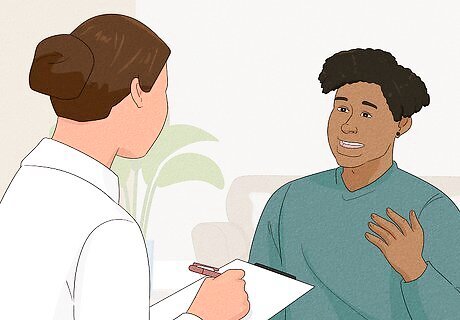
See a therapist. If you feel like you have no idea where to start, you might consider seeing a therapist. Create goals together and address what is most important for you to make a change. If you struggle with substance abuse, consider seeing a therapist who specializes in treating addiction. They can help you cope with cravings or stressors that increase your likelihood of using. If you struggle with anxiety, depression, or another mental disorder, talk to your therapist about treating this, too.
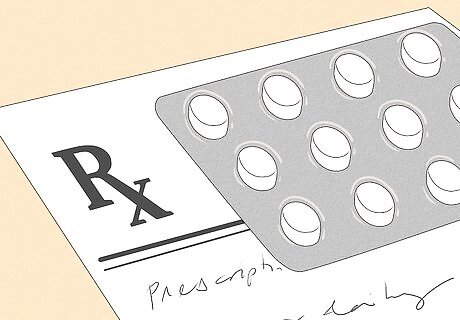
Obtain medication. Sometimes 'toughing it out' can cause more problems and affect you over the long-term. If you've tried to work through your mental health problems and have struggled time and again, it may be time to try medications. Medication can help to treat symptoms associated with problems like depression, anxiety, and ADHD. If you start medication, recognize that they may take a few weeks to kick in. Be patient and communicate with your prescriber about any side-effects or negative changes you notice.

Go to a support group. If you're struggling with a problem, it can be helpful to join a support group. Especially if you feel isolated and alone, a support group is a great way to join others who get it and have 'been there.' Whether you suffer from an illness, addiction, mental health disorder, or have endured difficult circumstances, there's likely a support group for you. Join a support group to share your experiences, get advice, and talk honestly about your feelings.




















Comments
0 comment